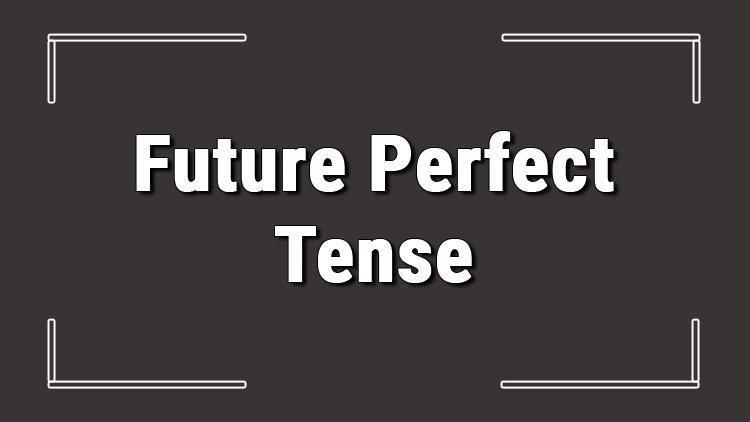Future Perfect Tense (İngilizce gelecek zamanda tamamlanmışlık) örnek olumlu, olumsuz ve soru cümleleri ile alıştırmalı konu anlatımı
Güncelleme Tarihi:

Merhaba sevgili öğrenciler. Bu dersimizde future perfect tense anlatacağım. Future perfect tense nedir? Future perfect tense ile olumlu cümle örnekleri nelerdir? Future perfect tense olumsuz cümle örnekleri nelerdir? Future perfect tense ile soru cümlesi örnekleri nasıldır? İşte future perfect tense yani gelecek zamanda tamamlanmışlık ile ilgili kurulan olumlu, olumsuz ve soru cümleleri örnekleri.
Future perfect tense gelecekte tamamlanmış zaman şeklinde Türkçe ’ye çevrilir. Yani future perfect tense ile gelecekte yapılacak ve dolayısıyla tamamlanacak olan işlerin ifade edilmesinde kullanıldığı için bu ismi alan bir zaman olmuştur. Bu zamanla “yapmış olacağım, etmiş olacağım” şeklinde cümleler kurarız. Şimdi teker teker future perfect tense ile kurulan olumlu, olumsuz ve soru cümlelerinin yapılarını inceleyelim.
Future Perfect Tense Olumlu Cümle
Öncelikle “ı, he, she, it, you, we, they” olan özneler ile cümle başlar ve hemen yanına “will” ya da “ be going to” ve “have” yardımcı fiilleri gelir. Ardından sırasıyla fiil, nesne, yer zarfı ve zaman zarfı kullanarak cümlenin yapısı oluşturulur. Olumlu cümle kurmayı daha iyi anlamak için örnekleri inceleyelim.
I will have cleaned the house tomorrow. (Yarın evi temizlemiş olacağım.)
He is going to have slepth in his bed for two hours. (İki saat süreyle yatağında uyumuş olacak.)
She will have sent the letter by nextweek. (Gelecek haftaya kadar mektubu göndermiş olacak.)
You are have sent the letter by nextweek. (Gelecek haftaya kadar mektubu göndermiş olacak.)
They will have returned home in September. (Eylül ayında eve dönmüş olacaklar.)
Future Perfect Tense Olumsuz Cümle
Olumsuz cümle kurabilmek için “will” kullanılan cümlelerde will’den sonra “not” eki getirilir. Will not “wont” şeklinde de kullanılır. Eğer cümlede “be going to” kullanılıyorsa “am, is, are” sonrasında “not” getirilir. Şimdi örnekleri inceleyelim.
I will not have cleaned the house tomorrow. (Yarın evi temizlemiş olmayacağım.)
He is’nt going to have slepth in his bed for two hours. (İki saat süreyle yatağında uyumuş olmayacak.)
She wont have sent the letter by nextweek. (Gelecek haftaya kadar mektubu göndermiş olmayacak.)
You are’nt going to have taken the exam after two days. (İki gün sonra sınava girmiş olmayacaksın.)
They will not have returned home in September. (Eylül ayında eve dönmüş olmayacaklar.)
Future Perfect Tense Soru Cümlesi
Eğer cümlede “will” kullanılıyorsa “will” ile özne yer değiştirerek en başa getirilerek soru cümlesi oluşturulur. Eğer “be going to” içeren cümle kuruluyorsa “am, is, are” başa gelir ve özne ardından going to have şeklinde cümle devam ettirilir. Şimdi örnekleri inceleyelim.
Will I have clenead the house tomorrow? (Yarın evi temizlemiş olacak mıyım?)
Is he going to have slepth in his bed for two hours? (İki saat süreyle yatağında uyumuş olacak mı?)
Will she have sent the letter by nextweek. (Gelecek haftaya kadar mektubu göndermiş olacak mı?)
Are you have sent the letter by nextweek. (Gelecek haftaya kadar mektubu göndermiş olacak mısın?)
Will they have returned home in September. (Eylül ayında eve dönmüş olacaklar mı?)
Future Perfect Tense Olumsuz Soru Cümlesi
Olumsuz olan soru cümlesinde de “will” kullanılacak olan cümlede “wont” veya “will not” cümlenin başına getirilir. Be going to olan cümlelerde ise; cümlenin başına “is not, are not” gelir. Örnekleri inceleyelim.
Wont I have clenead the house tomorrow? (Yarın evi temizlemiş olmayacak mıyım?)
Wont they have returned home in September. (Eylül ayında eve dönmüş olmayacaklar mı?)
Are’nt you have sent the letter by nextweek. (Gelecek haftaya kadar mektubu göndermiş olmayacak mısın?)

